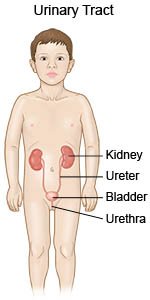Cystoscopy in Children
Medically reviewed by Drugs.com. Last updated on Aug 4, 2025.
A cystoscopy is a procedure to look inside your child's urethra and bladder using a cystoscope. A cystoscope is a small tube with a light and magnifying camera on the end. The procedure is used to diagnose and treat conditions of the bladder and urethra.
 |
DISCHARGE INSTRUCTIONS:
Seek care immediately if:
- Your child's urine turns from pink to red, or has clots in it.
- Your child cannot urinate at all and his or her bladder feels full.
- Your child has severe pain.
Contact your child's healthcare provider if:
- Your child's pain or burning becomes worse or lasts longer than 1 day.
- Your child's urine stays pink for longer than 1 day.
- Your child has a fever with or without chills.
- Your child urinates less than usual, or still feels like he or she has to urinate after using the bathroom.
- You have questions or concerns about your child's condition or care.
Related medications
Medicines:
Your child may be given any of the following:
- Antibiotics help treat or prevent a bacterial infection.
- Acetaminophen decreases pain and fever. It is available without a doctor's order. Ask how much to give your child and how often to give it. Follow directions. Read the labels of all other medicines your child uses to see if they also contain acetaminophen, or ask your child's doctor or pharmacist. Acetaminophen can cause liver damage if not taken correctly.
- Give your child's medicine as directed. Contact your child's healthcare provider if you think the medicine is not working as expected. Tell the provider if your child is allergic to any medicine. Keep a current list of the medicines, vitamins, and herbs your child takes. Include the amounts, and when, how, and why they are taken. Bring the list or the medicines in their containers to follow-up visits. Carry your child's medicine list with you in case of an emergency.
Care for your child after a cystoscopy:
- Have your child drink liquids as directed. Your child's healthcare provider may recommend that he or she drink more water than usual for 2 days after the procedure.
- Ask when your child can return to regular daily activities. Your child's healthcare provider may recommend that your child rest after the procedure.
Follow up with your child's healthcare provider as directed:
Write down your questions so you remember to ask them during your child's visits.
© Copyright Merative 2025 Information is for End User's use only and may not be sold, redistributed or otherwise used for commercial purposes.
The above information is an educational aid only. It is not intended as medical advice for individual conditions or treatments. Talk to your doctor, nurse or pharmacist before following any medical regimen to see if it is safe and effective for you.
Further information
Always consult your healthcare provider to ensure the information displayed on this page applies to your personal circumstances.
